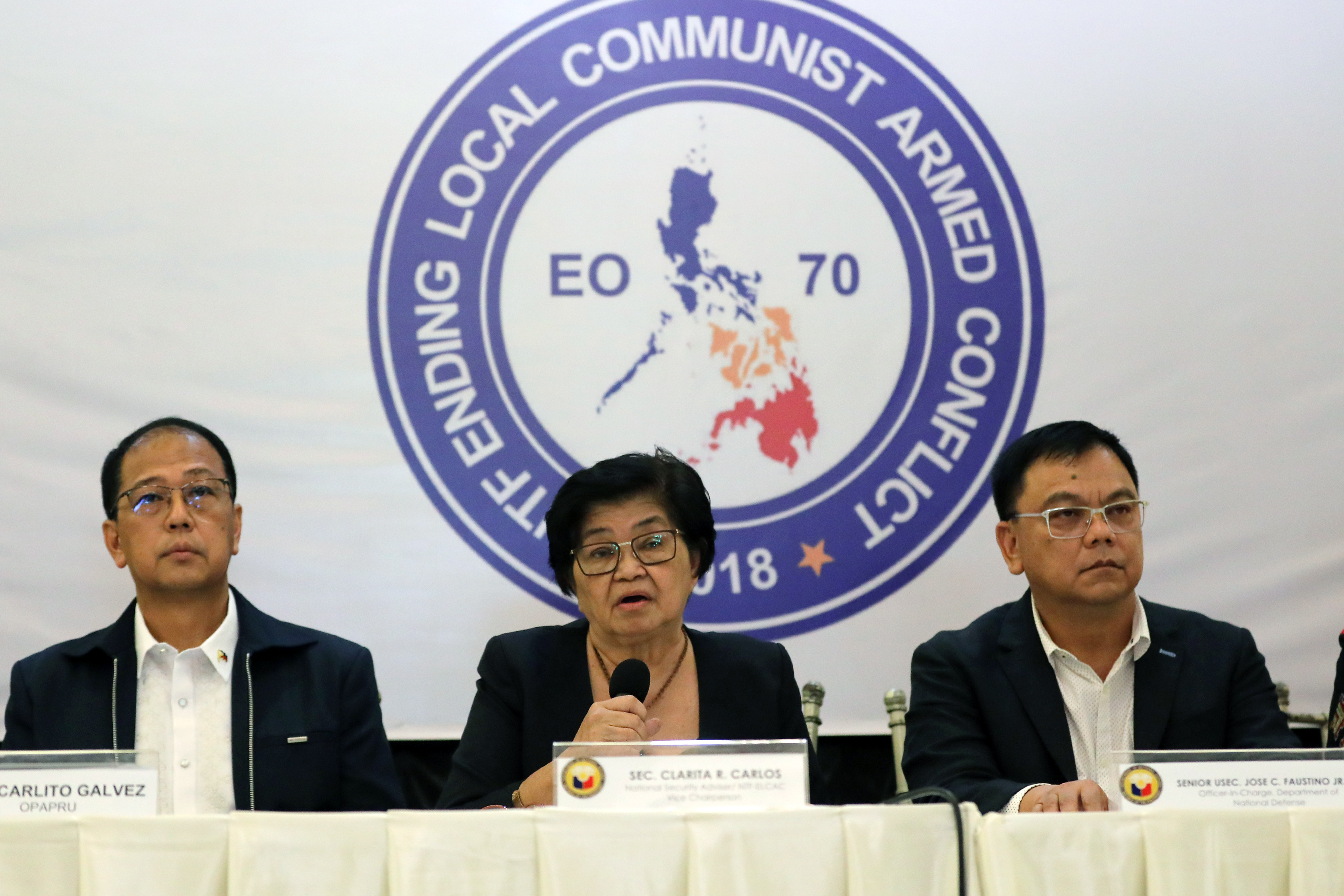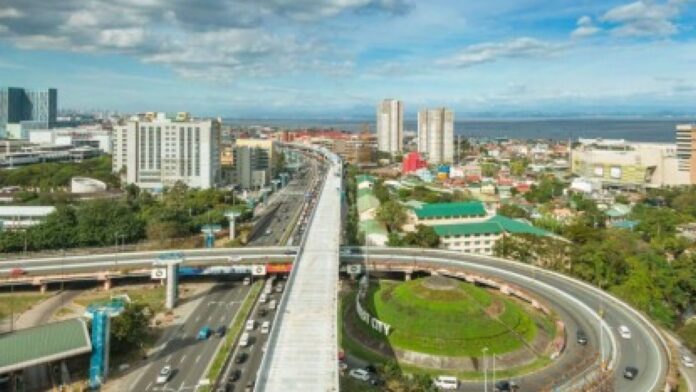President Ferdinand “Bongbong” Marcos Jr. has assumed the presidency amid difficult times, given the pressing national security challenges that continue to plague the country.
The pitfalls of lawlessness and armed conflict, territorial disputes, and economic and social threats are just some of the issues that need to be addressed by the Marcos government.
National Security Adviser (NSA) Clarita Carlos has made a clear stance that the new administration will pay attention to the needs of each Filipino to protect and safeguard the national interests.
Stressing that national security must be “reckoned on the individual level,” Carlos said she intends to undertake a “human security” approach that focuses more on monitoring the daily lives and addressing the concerns of the Filipino people.
“The security that we’re really concerned as an individual would be human security,” Carlos, a political scientist, said in a June 10 interview with ABS-CBN News Channel. “Food security, security ng water sources mo (of your water sources), security of the air that you breathe, these are all individual security issues.”
The United Nations Development Programme’s 1994 Human Development Report introduced a new concept of human security, equating it “with people rather than territories [and] with development rather than arms.” According to the report, threats to human security may be classified into economic, food, health, environmental, personal, community, and political security.
Marcos, in his inaugural speech delivered on June 30, vowed to transform the Philippines into an “agile and resilient” nation under his leadership.
He also promised to give Filipinos a better life in a “safer” and “more prosperous” nation by acting in haste and avoiding delays in making decisions.
“That is how agile and resilient Republics are made,” Marcos said. “The sooner we start, the surer and quicker the prospect of achieving our future. These are troubling times. What is happening to others can happen to us, but it will not. We see what’s happening.”
Job creation, Carlos said, is among the top priorities of the Marcos administration in its first 100 days to ensure human security.
“Create the jobs which are lost during the two-year [coronavirus disease 2019 or Covid-19] pandemic. Job creation is a national security,” she said.
Communists as ‘participants in change’
Apart from creating more jobs amid the prevailing Covid-19 pandemic, Carlos said it is also important to address inequalities to end the insurgency problem in the country.
The current administration would continue the local peace engagements with communist rebels, Carlos, who also concurrently serves as the vice chairperson of the National Task Force to End Local Communist Armed Conflict (NTF-ELCAC), said.
She also wanted the communist insurgents to be “participants in change.”

“Let us just invite them to be participants in the change. Huwag natin silang i-exclude (Let us not exclude them),” Carlos said. “Magtulungan na lang tayo na ayusin on the ground ang mga kailangang ayusin (Let us help each other fix everything on the ground).”
Carlos, who initially rejected the idea of reviving the peace negotiations between the national government and the Communist Party of the Philippines’ National Democratic Front, said it is up to Marcos if he will allow the resumption of the stalled peace talks.
In a hybrid press briefing last July 7, Armed Forces of the Philippines (AFP) acting spokesperson Col. Medel Aguilar said the military has made significant achievements against communist insurgency by reducing the number of its guerrilla fronts by almost 74 percent under the previous administration of President Rodrigo Roa Duterte.
When asked for an exact figure on how many New People’s Army (NPA) fighters were killed, surrendered and the remaining forces of the communist terrorists, Aguilar said he would rather say that the AFP has “regained or recovered more than 25,000 members, supporters, and sympathizers of the underground movement.”
“This is a very big number which (is) actually a strategic victory that we have achieved, we don’t say that it is a military accomplishment but it is a whole-of-nation accomplishment because even you, (the) media have contributed in spreading the good news of the E-CLIP (Enhanced Comprehensive Local Integration Program), the implementation of E-CLIP that gives the former rebels a new direction to start a new life,” he added.
2,000 remaining NPAs
As of this time, Aguilar said the remaining armed NPA members are around 2,000 but these numbers are still for validation.
At least six presidents had tried to forge peace with the CPP, but the attempts were short-lived because of the communist rebels’ incessant attacks against the government forces and civilians.
From 2010 to 2020, the NPA, armed wing of the CPP, has committed a total of 289 incidents of “willful killings” of civilians, according to the data released by the Armed Forces of the Philippines in 2021.
The incidents claimed the lives of 373 individuals, including 296 civilians and 77 soldiers.
The highest number of incidents were recorded in 2019, with 66 that resulted in the death of 78 civilians and six military personnel.
The perennial problem of communism serves as a hindrance to the economic growth of the country, especially in rebel-infested areas.
In 2021, the Anti-Terrorism Council issued a warning against providing financial and material support to the CPP-NPA-NDF. The warning came amid the communist movement’s engagement in terrorism financing.
‘Low, medium, high’ security threats
Carlos also emphasized the need to identify the “low, medium and high” threats to the national security.
The move would enable the government to come up with “short-, medium-, and long-term” plans to ensure stability in the country, Carlos said.
“Let us categorize our security into low threat, medium threat and high threat,” she said. “Siguro, sa akin (Perhaps, on my part), and I’m not being naive about it kasi alam ko (because I know) what can be done. They are immediately doable. They (plans) are for short-, medium-, and long-term.”
Carlos said the state of food security could be considered a “low” threat, while the problem on energy sector could be a “medium” threat.
She, however, believed that there is no “high” threat to national security, as she dismissed the seriousness of the long-standing South China Sea (SCS) disputes among the claimants since “nobody wants to go to war.”
“Walang high risk eh kasi (There is no high risk because) nobody wants to go to war. We try to think it’s about the contested South China Sea. I don’t think so. It’s not a high risk. Neither one of any of the actors there would constitute a high threat because nobody wants to go to war,” Carlos said in a June 24 interview with GMA’s The Mangahas Interviews.
Identifying commonalities
To resolve territorial disputes, Carlos acknowledged that it is vital to identify “commonalities” among SCS claimants, which include China and the Philippines.
The approach, she said, would help the concerned parties to “move forward.”
“The best framework really for two or more political actors is what is called deep understanding. The German term is ‘verstehen’. You try to understand China where China is coming from. China also has to understand us where it is coming from. And then let us identify our commonalities,” Carlos said.
Marcos earlier announced his plan to adopt the independent foreign policy of his predecessor, former president Rodrigo Duterte, saying it is “best for the national interest.”
Duterte’s independent foreign policy, which is “being friend to all and enemy to none,” will benefit the Philippines and its allies, Marcos said.
“I think it is to be advantageous not only to our friends in China, but to all our friends around the world,” Marcos said.
Own national security framework
Carlos also sought to pursue a different path, crafting the country’s national security goals and strategic objectives far from the prism of other countries such as the United States (US) and China.
“Mag-declare tayo ng sarili nating (Let us declare our own) framework because we understand ourselves best and let us not look at our national security issues from another prism, neither China nor the US, but our prism as Filipinos,” she said.
She said the Marcos government needs the “commitment and the courage” to come up with its own national security plan.
“You only need to change your perspective,” Carlos said. “It is really the President of the Republic who will stir the boat of our country and I hope and I agree with this. We were on the same page on most things.” (PNA)


